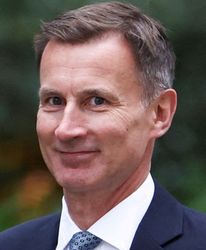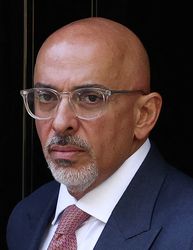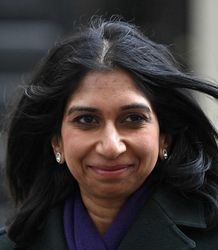As many as eight MPs remain in the fray to replace Boris Johnson as leader of the Conservative Party and to become the next prime minister of the United Kingdom. The eight have the support of at least 20 MPs; they will require a minimum of 30 votes to advance further. From the next round onwards, the candidate with the fewest votes will be knocked out, till the field is whittled down to two, latest by July 21. Conservative Party members will then make the final choice through postal vote by September 5.
Here are the brief profiles of the eight MPs who are fighting the first round on July 13. Most of them will either be voted out or will cut deals with frontrunners like Sunak, Truss and Mordaunt for key posts in the next government.
Rishi Sunak
42, former chancellor of the exchequer
Sunak resigned on July 5 as chancellor of the exchequer along with health secretary Sajid Javid, triggering an avalanche of resignations leading to Johnson’s downfall. For a large number of Tory supporters, Sunak was Johnson’s presumed heir for a long time, his popularity burnished by his efficiency in offering a competent financial response to Covid-19.
But he faces unexpected headwinds after revelations that his wife, Akshata Murthy, daughter of Infosys founder N.R. Narayana Murthy, opted for non-domicile status, which allowed her to avoid paying tax in the UK. Adding to Sunak’s woes is the fact that he retained his US green card for a while even after taking over as chancellor and the fixed-penalty notice he received for attending booze parties during the lockdown.
Some critics also pointed out that he was the first chancellor to find a place in the Sunday Times rich list and that he chose to build a £400,000 leisure complex at his £2million Yorkshire mansion, even as the UK faced double-digit inflation, showing that he is out of touch with the travails of the common man. His tax hikes as chancellor, too, have been unpopular. Moreover, Johnson’s inner circle is unhappy with Sunak, as they feel that the former chancellor was not sufficiently loyal and was planning his leadership campaign even as he served in the cabinet.
Yet, Sunak remains consistently on top of opinion polls and remains the only Tory to have an edge in a head-to-head matchup with Labour leader Keith Starmer. His decision to quit the Johnson cabinet, too, has added to his popularity. Sunak is unwilling to lower taxes unless the economy improves or the government can find savings elsewhere. He, however, backs Johnson’s plan to cut down a fifth of civil service posts by 2025. Sunak has been endorsed by Deputy Prime Minister Dominic Raab and Transport Secretary Grant Shapps among others.
Liz Truss
46, foreign secretary
Truss, who served under three Conservative prime ministers, left the G20 summit in Indonesia midway, to return to London following Johnson’s resignation. Truss is an unusual Tory—her parents were Labour supporters, she was a Liberal Democrat in her late teens and she attended a northern comprehensive school. She, however, turned out to be a staunch Tory: a champion of free markets, low taxes and small government.
Launching her leadership campaign, Truss has promised to cut taxes, reverse the recent National Insurance hike and reform business rates. Although she voted against Brexit in 2016, she has since become one of its staunchest proponents, making her increasingly popular among the Tory rank and file. A perennial advocate of enhanced defence spending, Truss was recently seen driving a tank wearing a headscarf, copying an iconic image of former prime minister Margaret Thatcher.
Her leading role in supporting Ukraine in its war against Russia has won her more admirers. Her decision to challenge the European Union by unilaterally overriding the Northern Ireland protocol, too, has been hugely popular. Truss could also be the go-to candidate for Johnson loyalists who are angry with Sunak.
Penny Mordaunt
49, minister of state for trade policy
On the day Johnson resigned, Mordaunt was the odds-on favourite among bookies to succeed the PM. An opinion poll held on July 11 among Conservative Party members, too, saw her finishing on top. The 49-year-old former navy reservist who serves as junior trade minister chose not to quit her post during the anti-Johnson rebellion, although she did not hesitate to criticise the PM during the partygate scandal. A prominent Brexiteer and eurosceptic, she is known for her pragmatic approach towards governance and is seen as a leader capable of uniting various Tory factions. Although she is a junior minister and not a cabinet member, her past experience include cabinet stints as home secretary and secretary for international trade. She also wields some influence as a member of the One Nation caucus that represents liberal Tory MPs. While Mordaunt’s candour, pragmatism and barrack-room humour are appreciated by a section of the party, her advocacy of transgenders could turn out to be a liability.
Tom Tugendhat
49, chairman of the foreign affairs committee of the parliament
A retired military officer who heads the foreign affairs committee of the parliament, Tugendhat has been one of Johnson’s strident critics. He entered the Commons in 2015 after tours of duty in Iraq and Afghanistan. Although he lacks any cabinet or shadow cabinet experience, Tugendhat has gained many followers on account of his articulation, especially while speaking on defence concerns and diplomacy. He has promised to tackle the cost of living crisis, reduce taxes and invest in the neglected regions of the country. Although he is seen as a relative wildcard by political observers, his support among the leftist and centrist Tories could turn him into a formidable contender.
Jeremy Hunt
55, chairman of the select parliamentary committee on health and social care
Hunt, who headed the health and foreign departments under Theresa May and David Cameron, lost to Johnson in the last leadership elections. As he never served in the Johnson cabinet and always kept his distance from the prime minister, Hunt offers a clean break from the outgoing administration’s policies and legacy. He is the only experienced candidate from outside the Johnson government. Although he used to be a stalwart of the left-wing of the Conservative Party, Hunt has promised the lowest rate of business taxes in the western world to win over the Tory base.
Nadim Zahawi
55, chancellor of the exchequer
Born in Iraq to Kurdish parents, Zahawi came to the UK at the age of nine, after his family was forced to flee Saddam Hussein’s persecution of the Kurds. After a degree in chemical engineering from University College London, Zahawi launched several successful business ventures, becoming a multi-millionaire in the process. He became a part of the Tory mainstream after Johnson appointed him vaccines minister during the peak of the pandemic. Zahawi became a member of the cabinet last September when he was given the charge of the education department. On July 5, Johnson elevated him as chancellor following Sunak’s unexpected resignation. Less than 48 hours later, Zahawi, too, joined the anti-Johnson rebellion, asking the prime minister to quit.
Although he is a staunch Brexit supporter, Zahawi has a strong base among the moderates in the party. He will try to draw strength from his phenomenal personal story and his successful record in business and government. But his decision to accept the chancellor’s post during the cabinet revolt and the fact that he already had a campaign team in place could go against him.
Suella Braverman
42, attorney general for England and Wales
The incumbent attorney general, whose parents are of Indian origin, announced her candidature even before Johnson decided to quit. Braverman joined politics after reading law at Cambridge and earning a master’s in European and French law at the Pantheon-Sorbonne University, Paris. She has been an MP since 2015, representing the Fareham constituency in Hampshire. A committed Brexiteer, Braverman has promised to stay true to Johnson’s 2019 Conservative manifesto. She has promised rapid and large tax cuts to ease inflation and has called for shelving the target of reaching net zero emissions by 2050. She said she would scrap the Northern Ireland Protocol and promised to take the UK out of the jurisdiction of the European Convention on Human Rights. Braverman has also assured a tough line on immigration.
Kemi Badenoch
42, former minister of state for equalities
Born in London to parents of Nigerian origin, Badenoch flipped burgers while in school to support herself. An IT professional-turned-lawyer-turned politician, she made a mark in national politics with her extraordinary performance in the parliament over the past three years. She launched her leadership campaign after quitting her junior minister post on July 6 and has promised a “strong, but limited government”, which would be guided by a “nimble centre-right vision”.









